#october 1918
Text

Pigeon Message from Major Whittlesey to the Commanding Officer of the 308th Infantry
Record Group 120: Records of the American Expeditionary Forces (World War I) Series: Records of Divisions File Unit: Field Messages - 32.16
This is a message delivered by pigeon from the commander of the "Lost Battalion" to the headquarters of the 308th Infantry requesting a halt of the artillery barrage that was causing numerous friendly fire casualties.
[hand written top left side of page "No. 8."] [circle with squiggle containing "1" on top right side of page] [stamped square with illegible lettering and hand written in red "6" and hand written in black "70"] [hand written "Oct 4"] P I G E O N M E S S A G E RECEIVED AT MESSAGE CENTER [illegible blacked out word] 4:22 PM TO C. O. 308th INFANTRY FROM 1st BN 308th INFANTRY WE ARE ALONG THE ROAD PARALELL 276.4. OUR AR ILLERY IS DROPPING A BARRAGE DIRECTLY ON US. FOR HEAVENS SAKE STOP IT. WHITTLESAY MAJ 308th [hand written vertically along right hand border or page "277-32-16"] BIRD RELEASED 3 P.M. RECEIVED AT LOFT 4:05 PM. [red hand written check mark] DISTRIBUTION G 3 [hand written check mark in pencil] G 3 BULLETIN BOARD C OF S G 2 152 FIELD ARTILLERY BRIGADE FILE [hand written in blue "540"] [small hand written "4" contained in small hand drawn circle.]
59 notes
·
View notes
Text

MASTERS OF THE AIR - COMPREHENSIVE ASTROLOGICAL CHART
follow up to the band of brothers and the pacific editions. if someone’s missing, it’s because i couldn’t find their exact birthdate / place (know that i looked…oh so hard lmao.) as i said before, i don’t know when any of them were born (as in time of day), so ascendant and mc are not included!
if you would like to learn more about how to read a chart / what things mean / how cusps work, you can find my own personal astrology cheat sheet here.
#mine#masters of the air#this took...way too long#the only ones up for debate#is bucky's is either 08/09 of september but i went with 8 bc that's my birthday and im biased#and brady who is either the 5th of october 1918 or october 27 of 1920. i went with the date listed on what i believe to be his draft card#romantic compatibility is by venus!
3 notes
·
View notes
Text
Personally, I think if you describe yourself as a socialist and also have a bust of Vladimir Lenin's head in your house, I should be allowed to smash that bust over your head with no consequences.
#kai rambles#vent post#im just#im so fucking tired of tankies man#yeah mate youre definitely on the left#since you. you know. glorify the guy who killed all the leftist anarchists as soon as he had secured power#i totally believe youre an advocate for restorative justice#thats why you keep a bust of that guys head who either killed his political oponents or put them in concentration camps#yeah i totally dont think your ideology is fascism with a red bow on top#i mean even before the october revolution or the february revolution even. oh and before that revolution in 1905 lenin argued that party#members should not express themselves indepenfent of the party and the party leadership. the whole bolshevik v menshevik thing#yeah no fascist leanings there. not at all. makes sense that you as an anti fascist person would have a little statue of him in your house#and anyway he expelled the mensheviks around 1918 as well as the other socialist parties so no need to worry about that really#i mean he did also oppose the first free election after the october revolution but im sure that wasnt a red flag#haha funny red flag joke do you get it? haha#its not like he then accused the new assembly of being counter revolutionary and forcefully disbanded it and also there were those pesky#protesters marching in support of the assembly who just had to go and march right into soldiers gunfire#he also did partake in sending anyone opposing him or his government to inhospitable environments or just straight to the grim reaper#ugh#yeah he did some good things for russian citizens i wont argue that#but fuck you if you glorify him#he was a fucking tyrant#are you only antifa when the fascism is ringing the doorbell?#or are you actually antifa and pay attention when the fascism is coming from inside the house?
6 notes
·
View notes
Text


USS Minnesota (BB-22) in drydock at the Philadelphia Navy Yard, showing mine damage to bow, on October 1, 1918. She had struck a mine on September 29, 1918 off Fenwick Island on the Maryland/ Delaware border, laid by the German submarine U-117.
Note: "hull plating pushed into internal framing and many split seams with open rivet holes. The side armor at the top of the view does not appear to have been much distorted, if at all, by the explosion."
NHHC: NH 46026, NH 46027
#USS Minnesota (BB-22)#USS Minnesota#Connecticut Class#Predreadnought#Battleship#October#1918#drydock#dry dock#World War 1#Wotld War I#WWI#WW1#united states navy#us navy#navy#usn#u.s. navy#my post
25 notes
·
View notes
Text
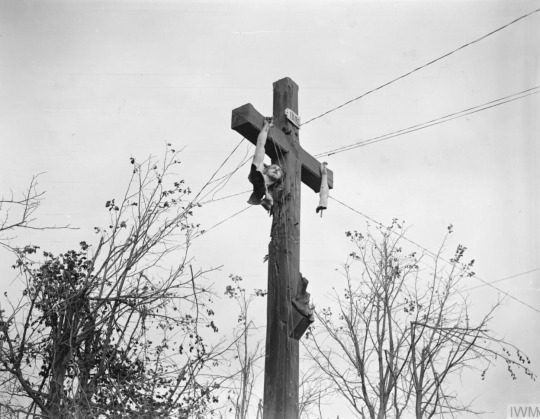
A damaged wayside crucifix near Bellenglise being used to hold telephone wires, 9 October 1918.
12K notes
·
View notes
Text

Egon Schiele, June 12, 1890 – October 31, 1918.
1914 portrait by Anton Josef Trčka.
633 notes
·
View notes
Photo

Popular Science Monthly, October 1918
717 notes
·
View notes
Text

British soldier carrying a wounded friend on his shoulders. Near Cambrai, 8 October 1918.
#historical photos#world war one#the first world war#the great war#1917#wwi#history#world war 1#canadian history#ww1#ww1 history#ww1 poetry#military history#ww1 fiction#british army#ww1 art
123 notes
·
View notes
Text
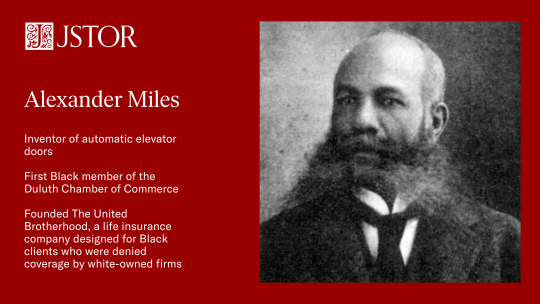
Alexander Miles, a prominent African-American inventor of the late 19th century, is best known for his groundbreaking invention - elevator doors that could open and close automatically. This invention transformed the safety of elevator rides, with automatic doors now considered a standard feature in modern elevators.
Born on May 18, 1838, in Circleville, Ohio, Alexander Miles was the son of Michael and Mary Miles. As a young adult, he relocated to Waukesha, Wisconsin, where he worked as a barber throughout the 1860s. It was while living in Winona, Minnesota, in 1870, that he met Candace J. Dunlap from New York City, who later became his wife. After the birth of their daughter, Grace, the family moved to Duluth, Minnesota.
In Duluth, Miles enjoyed significant success as a barber, setting up a barbershop in the four-story St. Louis Hotel. He smartly invested his savings into purchasing a real estate office. His business acumen led to him becoming the first Black member of the Duluth Chamber of Commerce. In 1884, Miles constructed a three-story brownstone building in an area that later came to be known as the “Miles Block.”
While taking elevator rides in his buildings, Miles noticed the dangerous risks associated with manually operated elevator shaft doors being left open. Determined to solve this problem, he invented a mechanism that allowed elevator shaft doors to operate at the correct times. The mechanism, which involved a flexible belt attached to the elevator cage touching drums positioned along the elevator shaft, automated the elevator doors through a series of levers and rollers. On October 11, 1887, Alexander Miles was granted a patent for his life-saving invention (U.S. Patent 371,207).
In 1899, Miles and his family moved to Chicago, Illinois, where he started The United Brotherhood, a life insurance company for Black customers who were denied coverage by White-owned firms. Eventually, Miles relocated to Seattle, Washington. Prior to his death on May 7, 1918, he was considered the wealthiest Black person in the Pacific Northwest area, largely due to the income from his invention. In recognition of his contributions, Alexander Miles was inducted into the National Inventors Hall of Fame in 2007.
Read more about Alexander Miles here.
228 notes
·
View notes
Text














BOBSTROLOGY
A completely serious presentation by @pegasusdrawnchariots and oatflatwhite
written version under the cut!
♈️Patrick O’Keefe [April 3 1926]
♈️Robert Sink [April 3 1905]
♈️John Julian [5 April 1924]
♈️Renée Lemaire [10 April 1914]
♈️James Miller [11 April 1924]
♈️Walter “Smokey” Gordon [April 15 1920]
♉️~Ronald Speirs [April 20 1920]
♉️Alton More [April 22 1920]
♉️Henry Jones [27 April 1924]
♉️Edward “Babe” Heffron [May 16 1923]
♉️John Martin [May 12 1922]
♉️Joseph Liebgott [May 17 1915]
♉️Norman Dike [May 19 1918]
♉️William Guarnere [April 28 1923]
♊️David Webster [June 2 1922]
♊️George Luz [June 17 1921]
♊️Roy Cobb [June 18 1914]
♋️Frederick “Moose” Heyliger [June 23 1916]
♋️Albert Blithe [June 25 1923]
♋️Donald Hoobler [28 June 1922]
♋️Thomas Meehan [8 July 1921]
♋️John Janovec [9 July 1925]
♋️Robert “Popeye” Wynn [July 10 1921]
♋️James "Moe" Alley [July 20 1922]
♌️~Burton “Pat” Christenson [July 23 1922]
♌️Eugene Jackson [29 July 1922]
♌️Donald Malarkey [July 31 1921]
♌️Edward Tipper [3 August 1921]
♍️Floyd Talbert [August 26 1923]
♍️Alex Penkala [August 30 1922]
♍️William Dukeman [3 September 1921]
♎️Eugene Roe [October 17 1922]
♎️Harry Welsh [September 27 1918]
♎️Lewis Nixon [September 30 1918]
♎️Ralph Spina [October 5 1919]
♎️Thomas Peacock [October 9 1923]
♏️Denver “Bull” Randleman [November 20 1920]
♑️Lynn “Buck” Compton [December 31 1921]
♑️Antonio Garcia [January 17 1925]
♒️Richard "Dick" Winters [January 21 1918]
♒️Herbert Sobel [January 26 1912]
♒️Carwood Lipton [January 30 1920]
♒️Warren “Skip” Muck [January 31 1922]
♓️Lester Hashey [23 February 1925]
♓️Charles “Chuck” Grant [1 March 1922]
♓️Robert Strayer [March 2 1912]
♓️Wayne “Skinny” Sisk [March 4 1922]
♓️Frank Perconte [March 10 1917]
♓️Darrell “Shifty” Powers [March 13 1923]
♓️Joseph Toye [March 14 1919]
6 Aries 🥉
8 Taurus 🥇
3 Gemini
7 Cancer 🥈
4 Leo
3 Virgo
5 Libra
1 Scorpio
0 Sagittarius 🥄
2 Capricorn
4 Aquarius
7 Pisces 🥈
10 🔥
13 🪨
12 💨
15 💧
20 cardinal
17 fixed
13 mutable
22 masculine
28 feminine
#band of brothers#hbo war#bobedit#hbowaredit#bobstrology#astrology#liz makes things#disclaimer: our interpretation is ironclad. we alone decide the law. argue w the wall.#< we say as an aries and scorpio with renee and bull in our corners <3
78 notes
·
View notes
Text

Medical Department - Influenza Epidemic 1918 - Influenza epidemic impedes war progress. To prevent as much as possible the spread of Spanish Influenza, Cincinnati barbers are wearing masks. Barbers all over the country took this precaution
Record Group 165: Records of the War Department General and Special Staffs Series: American Unofficial Collection of World War I Photographs File Unit: Medical Department - Influenza Epidemic 1918
A black and white photograph attached to a card shows the interior of a barbershop. On the left a barber wearing a mask works on a customer leaning back in a chair while a girl, with her back to the camera, looks on. On the right, another masked barber looks at the camera. He stands next to a customer in a barber chair and holds a razor. In the background are mirrors and many mugs for shaving cream.
50 notes
·
View notes
Text
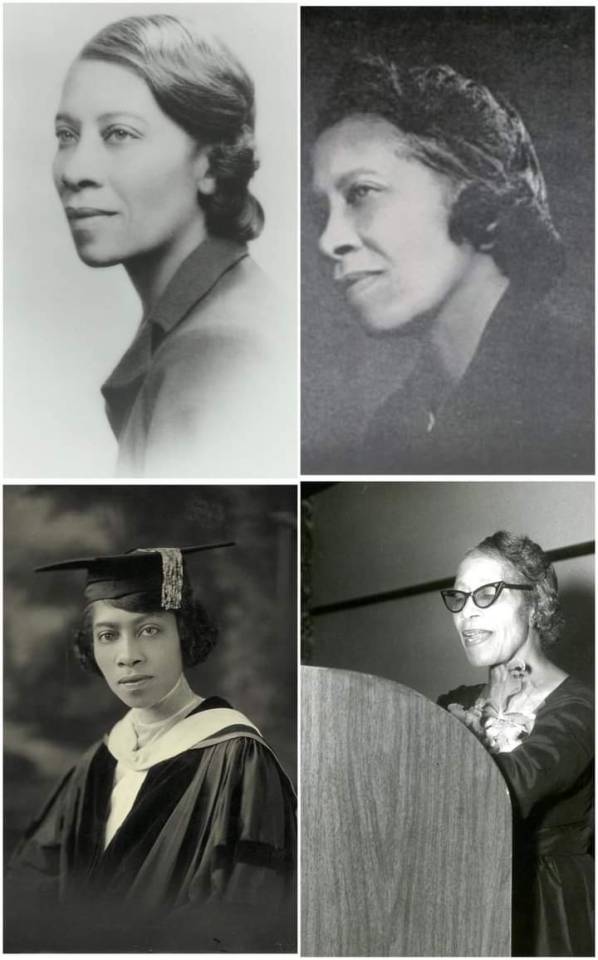
Eva Beatrice Dykes (13 August 1893 – 29 October 1986) was a prominent educator and the third black American woman to be awarded a PhD.
Dykes was born in Washington, D.C., on August 13, 1893, the daughter of Martha Ann (née Howard) and James Stanley Dykes. She attended M Street High School (later renamed Dunbar High School). She graduated summa cum laude from Howard University with a B.A. in 1914. While attending Howard University, where several family members had studied, Eva was initiated into the Alpha chapter of Delta Sigma Theta. At the end of her last semester she was awarded Alpha Kappa Alpha Sorority Incorporated's first official scholarship. After a short stint of teaching at Walden University in Nashville, Tennessee, Dykes attended Radcliffe College graduating magna cum laude with a second B.A. in 1917 and a M.A in 1918. While at Radcliffe she was elected to Phi Beta Kappa. In 1920 Dykes began teaching at Dunbar High School, and in 1921 she received a PhD from Radcliffe (now a part of Harvard University). Her dissertation was titled “Pope and His influence in America from 1715 to 1815”, and explored the attitudes of Alexander Pope towards slavery and his influence on American writers. Dykes was the first black American woman to complete the requirements for a doctoral degree, however, because Radcliffe College held its graduation ceremonies later in the spring, she was the third to graduate, behind Sadie Tanner Mossell Alexander (1921, University of Pennsylvania) and Georgiana R. Simpson (1921, University of Chicago).
After her graduation from Radcliffe in 1921, Dykes continued to teach at Dunbar High School until 1929 when she returned to Howard University as a member of the English Faculty. An excellent teacher, Dykes won a number of teaching awards during her 15 years of service at Howard University. Her publications include Readings from Negro Authors for Schools and Colleges co-authored with Lorenzo Dow Turner and Otelia Cromwell (1931) and The Negro in English Romantic Thought: Or a Study in Sympathy for the Oppressed (1942). In 1934 Dykes began writing a column in the Seventh-day Adventist periodical Message Magazine, this continued until 1984.
In 1920 Dykes joined the Seventh-day Adventist Church, and in 1944 she joined the faculty of the then small and unaccredited Seventh-day Adventist Oakwood College in Huntsville, Alabama, as the Chair of the English Department. She was the first staff member at Oakwood to hold a doctoral qualification and was instrumental in assisting the college to gain accreditation. Dykes retired in 1968 but returned to Oakwood to teach in 1970 and continued until 1975. In 1973 the Oakwood College library was named in her honor and in 1980 she was made a Professor Emerita. In 1975 the General Conference of the Seventh-day Adventist Church presented Dykes with a Citation of Excellence honouring her for an outstanding contribution to Seventh-day Adventist education. Dykes died in Huntsville on October 29, 1986, at the age of 93.
#black history#black literature#black tumblr#black excellence#black community#civil rights#black history is american history#black girl magic#blackexcellence365
114 notes
·
View notes
Photo

Germany and Austria in 1925
« Atlas des peuples d’Europe occidentale », Jean et André Sellier, La Découverte, 1995
by cartesdhistoire
From the summer of 1918, the German offensive in the West was an absolute failure. However, in Berlin, civil authorities continued to believe that Germany had the upper hand. On October 2, the General Staff informed the parties in the Reichstag of the urgent need to end the fighting swiftly, as the situation risked deteriorating decisively. The parliamentarians were shocked and dismayed. At 5 a.m. on November 11, the armistice was signed in Rethondes.
Yet, the Germans did not tangibly feel their defeat or experience it in their daily lives, except in the Rhineland. The country remained physically intact, its infrastructure undamaged, and no decisive battle led to the rout of the German army. The victory on the Eastern Front was also significant. The General Staff managed to conceal the army's disintegration by repatriating regiments in good order whenever possible, to the cheers of the crowds. Consequently, defeat for the Germans became an abstract notion that could be denied. How could a stable peace be established with a defeated opponent who refused to acknowledge their defeat?
Pétain and Pershing, the commander of the American Expeditionary Force, had initially wanted to continue the Allied offensive against a crumbling German army and advance to the Rhine to make the Germans understand and admit the extent of their defeat. However, after four years of war, this proved to be politically and morally impossible, a fact that Clemenceau and Foch fully understood.
The Treaty of Versailles, signed on June 28, was the best possible outcome at the time of its negotiation. However, it also sparked controversy among the victorious camp when Keynes published "The Economic Consequences of the Peace." This book, which became immensely popular, was used in Germany to justify opposition to the treaty and simultaneously created a myth in Anglo-Saxon countries that Germany was being unfairly treated.
79 notes
·
View notes
Text
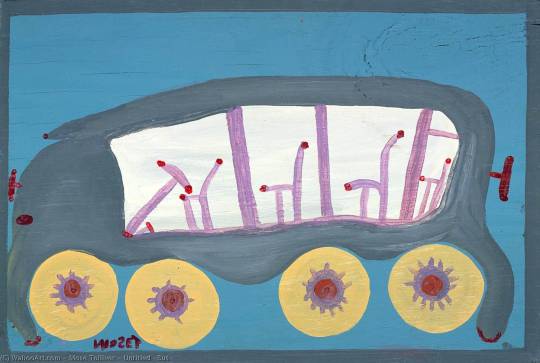
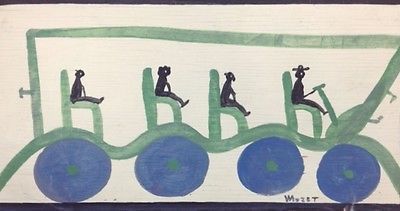
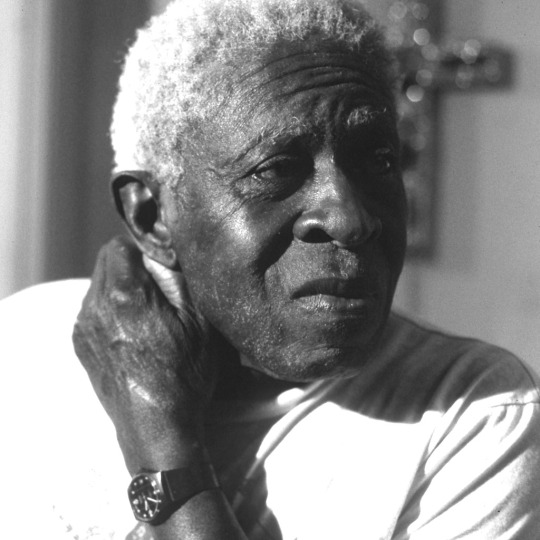

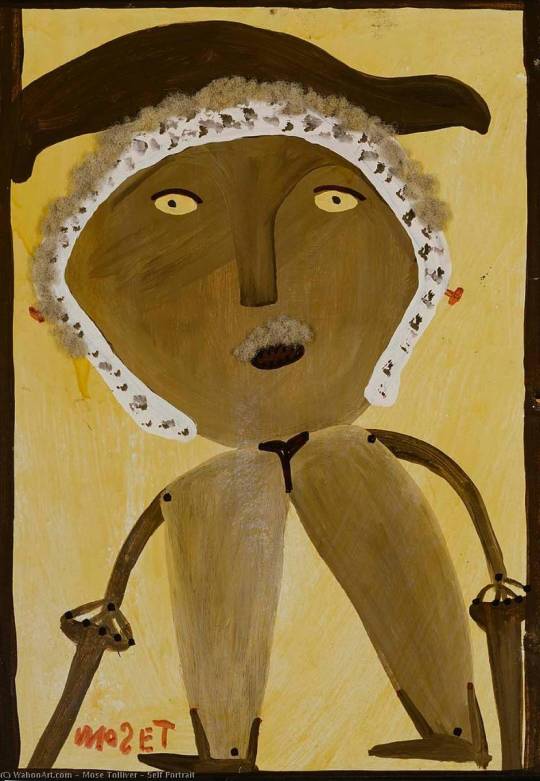

Mose Tolliver (1918/20 - 2006, American artist) was born one of 12 children to sharecroppers Ike and Laney Tolliver in the Pike Road community, near Montgomery, Alabama. His exact year of birth is unknown, though it is known he was born on the Fourth of July as well as between the years 1920–25. He attended school only until the third grade due to a self-described lack of interest in education. In the 1930s, the family moved to Montgomery, Alabama where he helped support his parents and their large family by doing odd jobs.
In the early 1940s he married his childhood friend, Willie Mae Thomas, and had 13 children, 11 of whom survived to adulthood. During the late 1960s, while working at McLendon's furniture factory, he had a severe injury where his legs were crushed when a half-ton load of marble shifted and fell from a forklift as he was sweeping in the furniture factory. After this incident, he turned to painting to combat boredom, pain and long hours of idle time. Although many say that his career started after the accident, Tolliver claims he painted beforehand. He would often turn his paintings upside-down and paint the picture of perhaps an animal and landscape positioned from various directions. Tolliver's titles are wildly divergent; e.g., "Smoke Charlies," "Scopper Bugs," or "Jick Jack Suzy Satisfying her own Self".
On October 30, 2006, Tolliver died from pneumonia in Montgomery, Alabama.
107 notes
·
View notes
Note
41. “Sleep. I’ll keep you safe.”
This one hurts so good
Unedited fic is unedited. Set in 1918, at the end of the war when Matt is trying to limp his way through the absolute slog of shit that was the proto-blitzkrieg of the last months of the war. Alfred is trying to pretend he's not avoiding trench duty at the Meuse–Argonne because of the trauma of the American Civil War. I was inspired by my Canadian great-grandfather coming home with American buttons on his coat instead of British or Canadian maple leaves that I inherited and made into earrings, lol.
October, 1918
“Give me a hand, Mattie, fuck.” Alfred cursed all the way up as the tailgate of the troop truck dropped. He was stuck on the single cobblestone that managed to give any traction under the three inches of mud. But it may as well have been concrete, for all he could leverage himself out. In the silvery light of the following truck waiting for its turn to round the corner of the checkpoint, Matt was only a hunched-over figure and a pair of gloved hands that grasped him by the wrists and managed to swing him free. His pack landed with a thud ten seconds before he did, and he was pulled roughly to his feet, and his ass finally found a bench. Almost instantly, the cold wood bit through his layers. Matt had disappeared down the benches and into the dark shelter of the canvas cover.
A soldier, looking beat to shit, offered him a light, and he handed out cigarettes, bribing his way into goodwill. They were all lightly dusted in snow, and sleet battered collars turned up even as it got dryer.
“You’re under Lieutenant Williams, yeah? Where’d he get too?”
Weary soldiers nodded up under the cover.
“Mattie!” Alfred handed his cigarette to another man and cupped two hands over his mouth to shout over the engines. “What’re you avoiding me for? Get your sorry ass down here before I start telling embarrassing stories about you.”
No response, no movement. Soldiers looked confused.
“Well, kiddo, guess I’m just going to have to start telling folks about—”
“Just what the fuck is so important—” Matt appeared, just like that, steadying himself on the shoulder of one of his men. They glanced up, a little protective, a little annoyed. Alfred didn’t register it. Matt was a trembling pillar, his face a bright, sharp point above his uniform like a flame over a candle dyed dark with soot.
“You look like shit.” Alfred raised a hand to grab Mattie’s shoulder and he slapped the hand away with a dark expression. The message was clear. He was a leader here, an officer of the British army, not Alfred’s baby brother. Another word and Alfred would be tossed off the back of the truck to enforce the silence.
"Don't use me as a distraction to get out of combat." Matt snapped and disappeared back under the canvas, and Alfred let him. At least it was warmer there. He wasn't avoiding anything.
Soldiers stared at him, and he felt sweaty despite the fall air. He wasn't avoiding anything. Just because he'd had six planes shot out from under him in as many weeks and the thought of another stint in a trench made him want to die didn't mean he didn't care. He offered up cigarettes with a smile, bribing his own Americans up with him.
“Headed up to the line anyways,” He made small talk with the soldiers around him, as popular for his cigarette supply as he was for the chocolate constantly in his coat pockets. Some of them were Americans, volunteering before the US joined the war. Boys from New York, Wisconsin, and other places had easily slid across the border without needing real paperwork. The convoy slid north on the icy roads, following the advance to leapfrog ahead of the infantry currently on the front line and pushing forward to relieve the men presently fighting their way back into Belgium. He dozed between them, one of them. He didn't much like his own under a British flag, but it felt... Solid somehow, that it was with Matt. At least it wasn't the sour old fart. He was thinking about Christmas when he was startled awake.
He awoke to coughing. Everyone had a bit of one, the rough soldier’s coughs that everyone had at some point. But this was horrible, and it was constant, drawing into someone’s lungs. And he recognized it. Alfred was instantly on his feet, weaving through the legs of sleepy men. He flung open a canvas flap and took the lantern swinging on the canvas, support in hand.
Matt was sitting, barely supported between two soldiers, his helmet off, the pale of before replaced with a violent flush, mouth open to breathe, trying to suck in air. His chin was tucked into his chest, and the coughing had not stopped.
“You don’t look so good, sir.” One of the sergeants said. Matt looked up.
“Just cold.” He said, trying to smile. “Everyone’s just cold. We’ll get moving and warm up, eh?”
The laugh he forced just turned into more coughing. Alfred stood there, lantern in hand. The soldiers around Matt looked protective, staring at him like he was an enemy they needed to hide their vulnerable commander from. Then, one sidled up to him. A boy from Wisconsin with a crop of ruddy curls. He pat Alfred on the arm and knew instantly he was a mechanic’s son from Green Bay, nestled right against Canada’s belly on the Great Lakes.
“We took the edge of a gas shell last week, and he’s been coughing like that since. Won’t listen to anyone and get a rest because there’s a shortage of officers.”
“Christ’s sake,” Alfred muttered. He sidled between bodies and inserted himself between his brother and one sergeant. He popped Matt’s helmet on and got close. The professional kind of close, resisting the urge to cradle Matt like he had their entire lives.
“There’s a casualty clearing half a mile up the road. Get fed, get dry, get some sober sack time, and I’ll make sure I get you in a goddamn staff car and back up the line before they’re assaulting anything, all right? Hand to God, I will get you back up here if you get some fucking rest.”
Matt was still, sweating now and fading to pale. He was shaking. And then he nodded.
“Hallelujah, you stupid bastard.” Alfred muttered.
He got Matt down the end of the truck as it jolted along, hands under his brother’s arms. His coat flapped open, and Alfred batted it away from him, annoyed.
“Button your fucking coat before you get pneumonia.”
A deep, curdled-chest cough was his response.
“Can’t.” Matt gasped. “Got caught on a bit of wire while we were digging funk holes, tugged right off.”
Alfred sighed.
“Okay, you poor dumb fuck. Give it here.”
Matt looked confused, and Alfred resisted the urge to feel his forehead. Instead, he shrugged his great coat off.
“Swap me.” He said. Matt just stared. Alfred huffed.
“You’re freezing.”
“I’m used to it.” He said and crossed his arms over his unfastened coat. “I was fucking born cold, I’ll die cold, and there’s not fuck all anyone can do about it in between.”
“Except give you a decent fucking coat you melodramatic shit.” Alfred was this close to smacking upside the head. He felt guilty for even having the thought as Matt exploded into coughing again. He dipped forward, collapsing into the bench at the far end of the truck bed, and Alfred gripped him by the waist, suddenly frightened he’d vomit or tumble over the tailgate and into the mud-churned roads. He pulled him back and took the opportunity to pull his coat off and wrap him in the better American one. Matt glared the entire time, but words were constricted by the endless wheezing when he went to speak. Alfred shoved his arms into the coat sleeves and buttoned it up, the American eagles shining in the lantern light. Matt glared daggers for a split second before he dragged in an inhale so violent he gagged. Every other soldier in the truck looked away. Alfred's chest hurt just listening.
At the next crossroads, American Red Cross nurses half-staffed the Casualty Clearing Station, and Alfred gave their commander his best, crooked, beaming smile and a wink. They gave him one of the visitor’s huts with a stove, a corrugated roof and two cots with clean sheets. Matt could barely stay on his feet. The mud sucked at his boots, and Alfred hauled him along. He considered picking Matt up entirely but wasn’t fully convinced the brass knuckles he’d mailed Matt years back had been lost somewhere along the way and wouldn’t end up embedded in his kidneys. At least not the way Matt was glaring.
He deposited Matt on a bed, dumped water from the pitcher and wash basin into a tin pot resting on the stove and cranked the stove as high as he could. It’d been almost 200 years since he’d needed someone to boil water and strange herbal plants and shove him and all the steam it could produce under a blanket.
Matt immediately listed to the side like a poorly loaded plane.
“Oh for fuck’s sake.” Alfred hadn’t even sat down yet. “Don’t be stubborn. Just breathe some fucking steam until you don’t sound like you’re about to die.”
“Sorry,” Came a very faint croak.
He frowned and peeked under the wool blanket. Matt had collapsed onto his side, and his eyes were squeezed shut, breathing too shallow to make him cough, but it still didn’t sound like he was getting enough of it.
“Hey.” Alfred pushed what was left of Matt’s damp curls off his forehead. He looked so strange with hair this short. It’d been shorn when Francis gave him up, and the look on him still made him look just as abandoned, even fully grown and in British green. The thought was as gone as quickly as it came.
“You are burning.” Alfred pressed a hand to his forehead. Matt’s eyes hadn’t opened. He made a gentle sound of acknowledgment but didn’t speak, like it didn’t surprise him.
“Have you had the flu yet?”
“No.”
“Is this—?”
“No.” He said. “This just… happens sometimes. I didn’t take the pills because I just— wanted some sleep.”
Still wearing Matt’s coat, Alfred stuck his hand in the pocket. Unmarked bottles of pills. He only recognized the contents of one of the bottles as aspirin.
“Do I want to know what’s in these?”
“No.”
“Can I ask where you got them?”
“Zee, Uncle Alasdair, Dad.”
“Let me guess, none of them knew who else was giving you what. God I am going to ban everything when we get home. Temperance is just the begin—”
Alfred was feeling uncharacteristically like a responsible older brother, ready to give Matt a whole hellfire and brimstone Baptist lecture for a moment before Matt spoke.
“I’m just glad you’re here.” He found his brother looking up at him, gratitude as evident on his face as misery.
The heavy eyes and distinctly sick flush belied an expression Alfred didn't see often. It came fast on the heels of father's anger or Matt's fear dissolving. Grateful, instantly secure and safe usually snuggled up in Alfred's side, burrowed there against his own madness or the household's hostility. He blinked and Alfred felt horrible as he teared up and then exhaled, pushing away the emotion.
But there was still something small to him. “I miss you more when I’m this pathetic. I feel better.”
"I know." Alfred pushed sweaty hair off his feverish face and gave him a tap on the chin. "Get some sleep kiddo, you know I'll keep you safe."
118 notes
·
View notes
Text

Rita Hayworth, October 17, 1918 - May 14, 1987.
On the set of Curtis Bernhardt’s Miss Sadie Thompson (1953).
319 notes
·
View notes